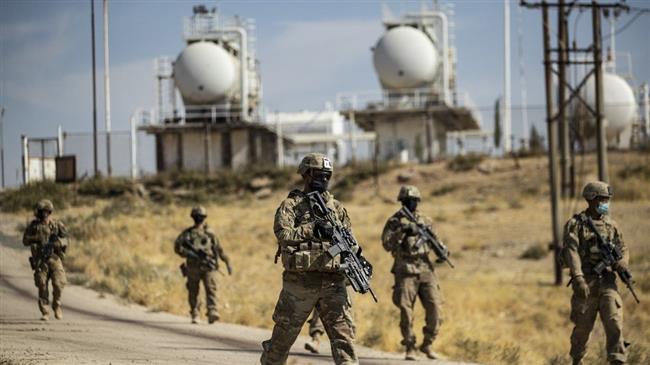Biden to pull plug on Trump OK for US oil company in northeast Syria
The administration of US President Joe Biden has reportedly decided not to renew a waiver that allowed a politically connected American oil company to operate in northeastern Syria and loot energy resources in the Arab country.
A US official familiar with the decision told the Associated Press on condition of anonymity that permissions given to Delta Crescent Energy (DCE) in April 2020, months after former president Donald Trump announced that he wanted to keep some US troops in the region to maintain control of oil profits, will not be extended.
Trump’s “keep the oil” message was no longer US foreign policy under the Biden administration, and using the US military to facilitate Syrian oil production was deemed inappropriate, the official claimed.
DCE was founded in 2019 by James Cain, US ambassador to Denmark under President George W. Bush; James Reese, a retired Army Delta Force officer; and John Dorrier Jr., a former executive with United Kingdom-based Gulfsands Petroleum.
Dorrier, who serves as the company's CEO, has warned that the company had some $2 billion in pending contracts to sell oil to US regional allies.
The company has said that it had not received official notice from the US Treasury Department indicating that its waiver would not be renewed.
The US military has stationed forces and equipment in northeastern Syria, with the Pentagon claiming that the troops deployment were aimed at preventing the oilfields in the area from falling into the hands of Daesh terrorists.
Damascus, however, says the deployment is meant to plunder the country's resources.
Syrian Minister of Petroleum and Mineral Resources Bassam Tomeh told al-Ikhbariyah TV on March 18 that the US and its Takfiri allies were looting oil reserves, revealing that Washington controlled 90 percent of crude reserves in the oil-rich northeast.
“Americans and their allies are targeting the Syrian oil wealth and its tankers just like pirates,” he said.
He noted that the cost of direct and indirect damage to the Syrian oil sector stood at more than $92 billion.
The US first confirmed its looting of Syrian oil during a Senate hearing exchange between South Carolina Republican Senator Lindsey Graham and former US secretary of state Mike Pompeo in late July last year.
On July 30 and during his testimony to the Senate Foreign Relations Committee, Pompeo confirmed for the first time that an American oil company would begin work in northeastern Syria, which is controlled by Kurdish militants.
The Syrian government strongly condemned the agreement, saying that the deal was struck to plunder the country's natural resources, including oil and gas, under the sponsorship and support of the administration of former US president Donald Trump.
After failing to oust the Syrian government through proxies and direct involvement in the conflict, the US government has stepped up its economic war on the Arab country.
Last June, the US enacted the so-called Caesar Act that imposed the toughest sanctions ever on Syria with the alleged aim of choking off revenue for the government.
The sanctions have crippled the war-torn country’s economy by prohibiting foreign companies trading with Damascus.
The US and the Europeans had already banned export and investment in Syria, as well as transactions involving oil and hydrocarbon products.
Syria has said the real purpose of the measures is to put pressure on Syrians and their livelihoods -- an inhumane attempt to suffocate ordinary people.
Officials also say the stepped-up smuggling of strategic Syrian resources is the latest inhuman tactic using people's basic needs as a tool to pressure the government.
VIDEO | Russian FM holds annual press briefing, highlighting ‘equality-based’ diplomacy
VIDEO | Israel rejects Gaza 'technocratic body' amid continued suffering in Gaza
Iranian prodigy Benyamin Faraji wins Under-17 title in Qatar
VIDEO | Press TV's news headlines
VIDEO | Tehran residents condemn US-Israel orchestrated mosque arson, vandalism
VIDEO | South Koreans demand end to joint US military drills and provocative policy against North Korea
VIDEO | A silent grief: Palestinian man struggles to recover remains of wife, children
Hind Rajab Foundation files complaint against Israeli genocidal propagandist in US




















 This makes it easy to access the Press TV website
This makes it easy to access the Press TV website